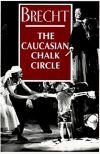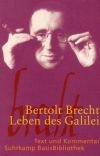
Bertolt Brecht's Stories of Mr. Keuner is a collection of fables, aphorisms, and comments on politics, everyday life, and exile. From 1930 til his death in 1956, Brecht penned these ironic portraits of his times as he was "changing countries more often than shoes." An ardent antifascist, Brecht roamed across Europe …

Az Arturo Ui-t Brecht 1941-ben írta, de a figura már 1934 óta foglalkoztatta. Akkor még ezt a címet kapta volna a színdarab: Das Leben Hitlers: Reichstagsbrand und der Prozess, ami nyilvánvalóvá teszi azt, hogy miről szól a példázat. Végül csak Brecht finnországi emigrációjában született meg a végleges mű Hitler …

Translated by Desmond I Vesey. Verses Translated by Christopher Isherwood. Ex-library Sticker on the Front..Softback,Ex-Library,with usual stamps markings, ,in fair to good all-round condition, ,365pages.

Presents a fable which uses the ancient Chinese tale of the test of the chalk circle to illuminate the author's vision of an alterable present and the hope of a future golden age

Bertolt Brecht a marxista eszmék iránt 1927-ben kezdett érdeklődni. 1928-ban megírta tandrámának számító művét Die Dreigroschenoper, Koldusopera címen. A műben a londoni szegények világát választotta a cselekmény helyszínéül. A mű három felvonásból, felvonásonként három jelenetből áll. .

The Good Person of Szechwan is a play written by the German theatre practitioner Bertolt Brecht, in collaboration with Margarete Steffin and Ruth Berlau. The play was begun in 1938 but not completed until 1943, while the author was in exile in the United States. It was first performed in 1943 at the Zürich …

A Kurázsi mama és gyermekei Bertolt Brecht, német drámaíró egyik legismertebb műve, melyben a szerző a háború erkölcse ellen emeli fel a hangját. A mű alcíme műfaj- és témamegjelölő is egyben: Krónika a 30 éves háborúból. A Kurázsi mamát sokan a 20. század legnagyobb drámájának, mások pedig minden idők legnagyobb …

Life of Galileo, also known as Galileo, is a play by the twentieth-century German dramatist Bertolt Brecht with incidental music by Hanns Eisler. The second version was written between 1945–1947, in collaboration with Charles Laughton. The play received its first theatrical production at the Zurich Schauspielhaus, …

 English
English Español
Español Deutsch
Deutsch

